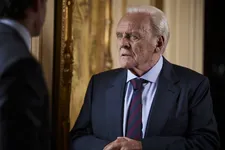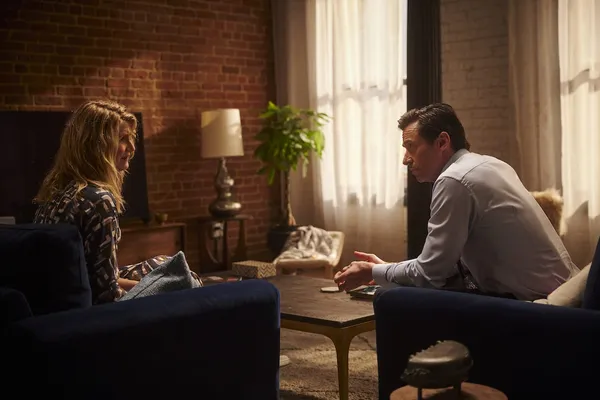 |
| Laura Dern and Hugh Jackman in The Son, Florian Zeller’s impassioned look at a family crisis Photo: courtesy of See-Saw Films / Sony Pictures Classics |
Florian Zeller’s The Son, adapted from his play Le Fils by Christopher Hampton (their collaboration on The Father won them the 2021 Best Adapted Screenplay Oscar and BAFTA), stars Hugh Jackman, Vanessa Kirby, Laura Dern, Zen McGrath, and Anthony Hopkins (Oscar and BAFTA wins for The Father). The centre of this intergenerational drama is occupied by a cypher. Nicholas (McGrath) is 17 and lives with his mother, Kate (Dern, terrifically flustered and well-meaning), in Brooklyn.
 |
| The Son (Le Fils) director and playwright Florian Zeller with Anne-Katrin Titze: “I profoundly believe that tragedy is preventable.” |
Nicholas is in pain, constant unbearable pain, he says. When his mother finds out that he had stopped attending school, a fact he cleverly managed to hide from her, she shows up at her ex-husband’s doorstep to discuss the situation. Peter (Jackman, who gives this role his all) and his second wife Beth (Kirby) just had a baby boy, and when Nicholas asks his father to move in with them in Manhattan, things become even more complicated. During a pivotal scene we get a better understanding of Peter’s own role as son, when he pays a visit to his father Anthony, played by the ever greater and greater Anthony Hopkins.
The disconnect between parent and child, generational rifts in the understanding of self, what to do with acute depression - never has it been more urgent to begin an honest discussion that doesn’t simply pretend to do so. “It’s not unusual to be loved by anyone,” croons Tom Jones during an exuberant dance number that adds a touch of lightheartedness. Zeller does not play the blame game and shows instead how the guilt the characters feel is already mounting up to a degree that doesn’t allow for any real understanding of the other.
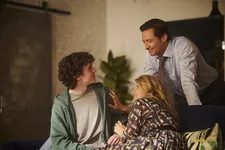 |
| Nicholas (Zen McGrath) with his parents Kate (Laura Dern) and Peter (Hugh Jackman) Photo: Rekha Garton, courtesy of See-Saw Films / Sony Pictures Classics |
From a stormy California, Florian Zeller joined me on Zoom for an in-depth conversation on The Son.
Anne-Katrin Titze: Hi!
Florian Zeller: Hello, Anne-Katrin, how are you?
AKT: I’m fine. You are in California, how’s the storm treating you?
FZ: I’m okay so far. It’s slightly oppressive, a lot of rain.
AKT: One of the sons in the centre of The Son, Nicholas, he is a cypher. I liked very much that you don’t simplify his pain, ever. It made me think about how little we know of what goes on in other people’s minds, their emotions, even family, even ourselves. It was clear to you that he would remain a cypher?
FZ: Yes, from the start I think I was looking for a certain opacity about him as a character. I didn’t want to try to explain or to justify it or to simplify it. I wanted to dare watching it or facing it as a deep mystery. Like a black hole, something you can try to understand but it’s always more difficult to understand.
And there is something very uncomfortable to have to deal with this. The fact that you do not understand. Especially from the parents’ perspective. They are loving parents, they are caring parents and they still do not know anymore what to do. It’s a story of a father and mother trying to help their son going through depression. They are all trying to understand what is going on there, to justify.
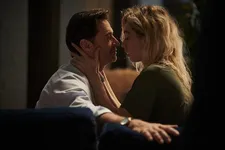 |
| Peter (Hugh Jackman) with his wife (Vanessa Kirby) Photo: Rob Youngson, courtesy of See-Saw Films / Sony Pictures Classics |
Of course you want something to blame for that. So it’s a lot about the divorce, maybe that’s the explanation. But that’s not my point, I think there’s no simple explanation. You have to accept that there is no simple explanation. We have to leave guilt and these feelings that make us blind and that are not helpful.
AKT: Which is very very difficult. As far as the setting is concerned, there is a washing machine room. Probably not since Room 237 in Kubrick’s The Shining has a room emanated such tension. It’s a great symbol, and it also made me think - because of what is hidden in the room - of Ibsen’s The Wild Duck.
FZ: This is what is very fascinating about cinema - that you can just have an image and it becomes meaningful with abstraction. At the beginning of the film we hear that there’s a gun somewhere. And you know, as Chekhov said “When you have a gun in act one you know it’s a tragedy.”
AKT: Right.
FZ: I did not want to represent that gun, to shoot it. But what we hear is that it’s hidden behind the washing machine, that’s all. And there are many shots of this washing machine rolling and rolling and I feel you don’t have to exactly understand what it means, but you feel that it means something and feel that there is a danger going on. And there is something that you cannot stop, that is rolling, rolling, that is like tragedy.
I profoundly believe that tragedy is preventable. That’s the reason why I wanted so much to make that film. I think that tragedy should have been prevented in that story if the right words would have been used, the right conversation would have been had. That’s why I wanted to make that film because I think we need to feel comfortable talking about these issues, mental health issues. More than we think we are in order to help people. I know there are so many people in pain, but I also know there’s so much ignorance and so much shame and guilt around these topics. I really wanted to make this film to open the conversation about it.
AKT: It runs in families, trauma is transmitted. You show that in the fantastic scene with Anthony Hopkins. Who was of course so spectacular in The Father. Here he is a totally different father, couldn’t be more different, and he is so emotionally precise as an actor. I was enthralled how he played this character’s menace and guilt, all rolled into one. It’s perfect. Can you talk a bit about this scene with him?
FZ: Yeah, after The Father many people came to me to say “Is he okay?”
AKT: Ha!
FZ: Because they felt that he was going through dementia. And I was like, he is very okay, he’s in great shape; he’s just an extraordinary actor! So it was funny for us to do the exact opposite in The Son. He is completely in control of the situation and very cruel. So it was joyful for us. And also, you know, to make a film is such an emotional journey. We did The Father together and I really wanted to be with him again.
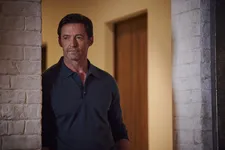 |
| Florian Zeller on Peter: “It’s called The Son, but we understand that this father, Hugh Jackman, is also a son.” Photo: Rekha Garton, courtesy of See-Saw Films / Sony Pictures Classics |
AKT: He is the best.
FZ: He was the first one who read the script when I finished it and he right away said that he wanted to do it. I wrote that scene with him in mind. It was an additional scene; it was not in the play. And it became like the pivotal scene of that film. It’s called The Son, but we understand that this father, Hugh Jackman, is also a son. And he’s a son in pain and he was just trying to be a better father than the one he had or to be the father he never had. Because, you know, this is who we are. We are all daughters and sons forever. Trying to deal with that, trying to do better.
AKT: It can be a difficult quest.
FZ: It is difficult but something we have to face so not to pass on to the other generation all the fears, the traumas. This is something the character is not doing; he is completely taken by his own past and that’s probably why is not capable of dealing with his present. So that scene between Hugh Jackman and Anthony Hopkins was meant to really highlight this generational dimension.
AKT: He hasn’t grown up from his own past and that is maybe why you called him Peter? As in Pan?
FZ: No that’s not why but it could have been! It was a very extraordinary moment for us to have the two of them. To have Hugh Jackman whom I really really respect as an actor and Anthony Hopkins in the same frame was really something exceptional.
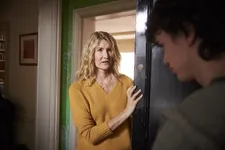 |
| Kate (Laura Dern) with her son Nicholas (Zen McGrath) Photo: Rekha Garton, courtesy of See-Saw Films / Sony Pictures Classics |
AKT: The in-between status of Peter is interesting. I noticed two moments when he is offered something to drink. The father offers him a drink and asks “ice?” Because he doesn’t know how he takes his drink. Then later on the son offers him and the mother tea and asks “sugar?” There is Peter in the middle who is also not seen by the other [male] characters, although he is trying so hard. I love those two moments that I somehow connected.
FZ: Thank you for noticing it. It’s true that I wanted to have three generations embodying three ways to deal with yourself, in a way. You have the Anthony Hopkins generation saying “Get over it, you don’t have to talk too much about our pain.” And you have Hugh Jackman who is a more narcissistic character somehow, trying to say “I’m going to fix everything. I’m a good father and I’m trying to save my son.” As if it was about himself, you know?
And this young actor [Zen McGrath] who is more capable somehow to articulate who he is and his pain and difficulty, but who is not heard. The thing is, especially after COVID, it came to me very clearly, that we are in a mental health crisis. There are so many people in pain in this generation.
AKT: Correct.
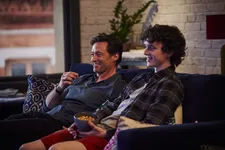 |
| Peter (Hugh Jackman) with his son Nicholas (Zen McGrath) Photo: Rekha Garton, courtesy of See-Saw Films / Sony Pictures Classics |
FZ: And most of them are not helped. They are not even aware that they are dealing with mental health issues. We are very ignorant about it because it’s very uncomfortable to dare facing this issue. I think many many people are left by themselves, that are not heard. That’s why I wanted to question that.
AKT: It needs to be addressed now more than ever. I teach a course on fairy tales and storytelling at Hunter College and we have big discussions about the issue of mental health that is addressed in some very old tales. Cinderella is also about the feeling of abandonment by a father who remarries. I did notice that my students are hungry to express themselves around this issue. But I want to mention to you the greatest listener in your film: The dog the therapist has, with his paws crossed, looking straight at the patient. Where did you find that dog?
FZ: It was a difficult one because I really wanted to have a dog capable to be as focused as a real therapist should be. Also, the funny thing about, you know, the story that says most of the time the dog looks more and more like …
AKT: … its owner?
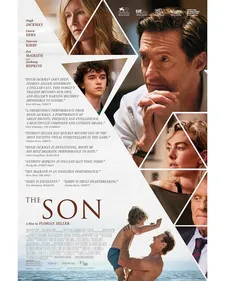 |
| The Son poster |
FZ: Yeah, so I tried to cast - I should not say that to the actor - but I tried to cast the actor and the dog at the same time. It was really funny to do that. But he [the dog] was the real listener, because again, that son is not heard. He could have been helped. The tragedy could have been prevented. This is what I profoundly believe, otherwise I would not have done that film. It’s all about the fact that I believe tragedy is preventable if the right conversation would have been had, the right words been used.
We feel that we are very comfortable talking about mental health issues, that we talk a lot about it as a “label.” But I feel that we are just pretending we are talking about it. But daring facing the pain, daring accepting the fact that there is no explanation sometime, no meaning, and that we have to deal with that. We should be comfortable about it, but we are not.
AKT: This remarkable scene with Dr. Harris in the psychiatric ward! I have never seen a scene like that, the decision-making process by the parents! All of the actors are fantastic at that moment - you can see the pain and the not-knowing on their faces. It’s remarkable.
FZ: Thank you, it was a long scene to shoot and a painful one to shoot. It’s true that it was like a dilemma and I wanted the audience to navigate between all the options and to question what they would do as parents. Now they have been told as parents that their son should stay, and you have their son begging them to believe him and then he is going to be okay.
And it’s so difficult as parents to know what’s right at the moment. Again, we were talking about trauma, intergenerational trauma, and I think why this father makes the wrong decision to take him home, is because he doesn’t want to be “the abandoning father” that his own father was for him. So again it’s about what hasn’t been solved or resolved before that comes here and disseminates the scene.
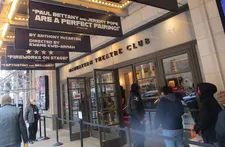 |
| Florian Zeller on the Manhattan Theatre Club: “The Son was supposed to be on Broadway before COVID” - now home to Anthony McCarten’s The Collaboration Photo: Anne-Katrin Titze |
AKT: The final image is a Pietà? Is that what you had in mind?
FZ: Yeah, it could be a Pietà, I had that in mind. It was just the simplicity and the very old representation of the pain, you know.
AKT: Are you planning on bringing The Son to Broadway as the play?
FZ: I don’t know. The Son was supposed to be on Broadway before Covid and because of Covid it has been cancelled, or postponed I would say.
AKT: Which theatre was it supposed to be at before Covid?
FZ: It was MTC, Manhattan Theater Club.
AKT: I just spoke with Anthony McCarten whose play [The Collaboration] is there right now. Maybe in the future! Thank you so much!
FZ: Thank you so much, Anne-Katrin!
The Son opens in cinemas in the US on January 20 and in the UK on February 17.








